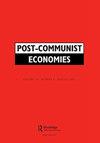有效医疗公共采购中的制度、腐败和透明度:来自中欧和东欧的证据
IF 1.8
3区 经济学
Q2 ECONOMICS
引用次数: 0
摘要
摘要医疗保健行业良好采购做法的好处是众所周知的。事实上,鉴于最近的新冠肺炎疫情,透明、有效和高效采购医疗产品和服务的重要性得到了进一步加强。然而,很少有证据表明,当公共采购在不同的制度环境中发挥作用时,程序或合同层面上发生的传统因素如何影响公共采购的有效性。因此,本文使用了11个中欧和东欧国家授予的医疗保健部门公共合同的大样本,为这一证据做出了贡献。研究结果支持了先前关于透明度和公开竞争性招标的重要作用的证据。事先要求竞争并允许不受限制的竞争对手数量的程序可以产生成本效益高的合同和更高的直接节约。考虑到授予合同的财务方面,有效的政府和减少腐败已被证明有助于更好的采购结果。此外,关于机构影响的结果有助于当前的学术辩论,因为它深入了解了获得成本效益的机制,并表明强大的机构可以在缓解与透明度较低和限制竞争程序有关的不利采购结果方面发挥重要作用。本文章由计算机程序翻译,如有差异,请以英文原文为准。
Institutions, corruption and transparency in effective healthcare public procurement: Evidence from Central and Eastern Europe
ABSTRACT The benefits of good procurement practices in the healthcare sector are well known. Indeed, the importance of transparent, effective and efficient procurement of medical goods and services has gained momentum even more in light of the recent Covid-19 pandemic. However, there is little evidence of how traditional factors occurring on a procedure or contract level affect the effectiveness of public purchases when they take play in different institutional environments. This paper, therefore, contributes to this evidence using a large sample of public contracts in healthcare sectors awarded in 11 Central and East European Countries. The results support the previous evidence on the important role of transparency and open competitive bidding. Procedures with a prior call for competition and allowing for an unrestricted number of competitors lead to cost-effective contracts and higher direct savings. Effective government and lessening corruption have proven to facilitate better procurement outcomes, considering the financial aspects of awarded contracts. Moreover, the results on the effects of institutions contribute to the current academic debate by providing insight into the mechanism of obtaining cost-effectiveness and showing that strong institutions can play an important role in mitigating the adverse procurement outcomes related to less transparent and competition-restricting procedures.
求助全文
通过发布文献求助,成功后即可免费获取论文全文。
去求助
来源期刊

Post-Communist Economies
ECONOMICS-
CiteScore
4.90
自引率
18.20%
发文量
21
期刊介绍:
Post-Communist Economies publishes key research and policy articles in the analysis of post-communist economies. The basic transformation in the past two decades through stabilisation, liberalisation and privatisation has been completed in virtually all of the former communist countries, but despite the dramatic changes that have taken place, the post-communist economies still form a clearly identifiable group, distinguished by the impact of the years of communist rule. Post-communist economies still present distinctive problems that make them a particular focus of research.
 求助内容:
求助内容: 应助结果提醒方式:
应助结果提醒方式:


